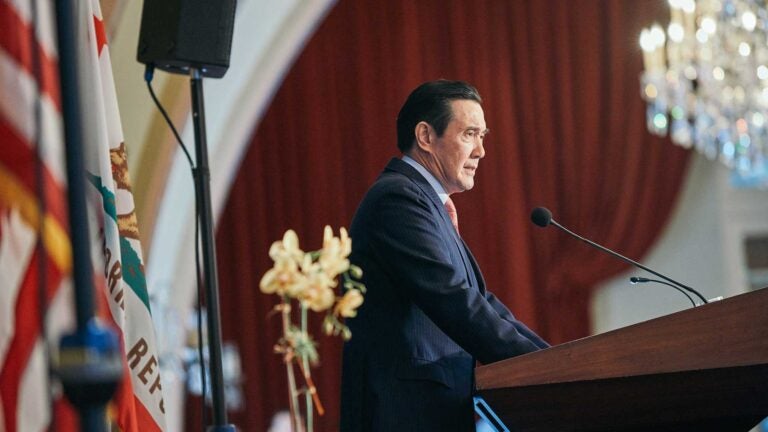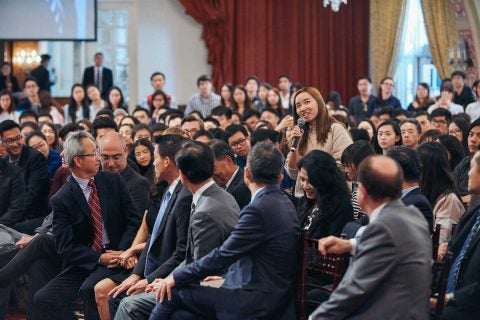
2017 Seth Hancock Photography
Former president of Taiwan visits USC
Ma Ying-jeou speaks at Town and Gown and takes part in a Q&A with USC Annenberg Dean Willow Bay
Hundreds of students, faculty, friends of USC and a core of international press gathered at USC’s Town and Gown on Nov. 6 to hear a conversation with Ma Ying-jeou, the former president of Taiwan.
Ma, hosted by the USC Center on Public Diplomacy at the USC Annenberg School for Communication and Journalism, spoke to the crowd and participated in a Q&A with Annenberg Dean Willow Bay.
“What better way to understand global engagement than to have someone whose eight-year presidency was dedicated toward advancing peaceful relations in one of the most dynamic and volatile regions?” said Jay Wang, director of the Center on Public Diplomacy.
Taiwan is in his heart.
C. L. Max Nikias
“For Dr. Ma,” said USC President C. L. Max Nikias, “Taiwan is in his heart. During his presidency, his greatest commitment was his pledge to strengthen international relations and create mutually beneficial relationships with Taiwan’s neighbors.”
Ma was born in Hong Kong but grew up in Taiwan and later served in the Marines and the Navy. He received his degrees from National Taiwan University, New York University and Harvard Law School. He served in a range of key roles in the government, from the Presidential Office’s First Bureau to the Justice Ministry.
Strong relations
Ma spoke to his USC audience about how Taiwan’s trade relations with mainland China are stronger than ever, and account for nearly double the amount of trade Taiwan has with every other country. However, the journey from blood to harmony, he said, “wasn’t easy.” Ma shared the story of the 68-year volatile relationship between mainland China and Taiwan from the Battle of Guningtou to the 1992 consensus, part of the cross-strait reconciliation policy with mainland China.

Ma finally had the opportunity to leave his mark on cross-strait relations in 2008, with his three-no policy: “No independence, no reunification, no use of force.” In his eight years as Taiwan’s president, Ma oversaw 23 agreements between Taiwan and mainland China — which placed cross-strait relations at the best they’ve ever been. Today, Ma likens the Taiwan Strait to a “boulevard of peace and prosperity.”
“What role,” Bay asked, “can you play in engineering change? What levels of power, diplomatic or otherwise — and are there people or nations who can assist you?”
“Ever since I stepped down as president, I try to be as silent as possible,” Ma responded.
“This is just the political ethics. Now that I’m no longer the president, I can’t force anyone to do anything. I can’t even ask my wife to do anything,” he joked.
“But what I can do is, I could share my experiences, either it’s successful or it’s not successful, and people, including the current administration, could use that as a reference.
“Or I could come to a country, a university like USC, to give a speech.”
The USC Center on Public Diplomacy was established in 2003 as a partnership between the USC Annenberg School for Communication and Journalism and the School of International Relations at the USC Dornsife College of Letters, Arts and Sciences. It is a research, analysis and professional education organization dedicated to furthering the study and practice of global public engagement and cultural relations. As part of the center, practitioners of public diplomacy aim to foster mutual trust and productive relationships, through educational exchange programs and cultural diplomacy.
